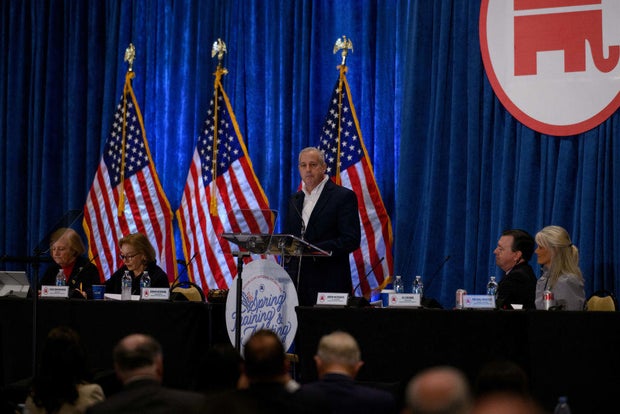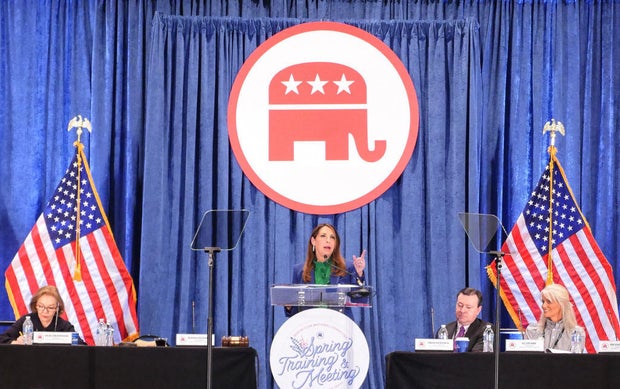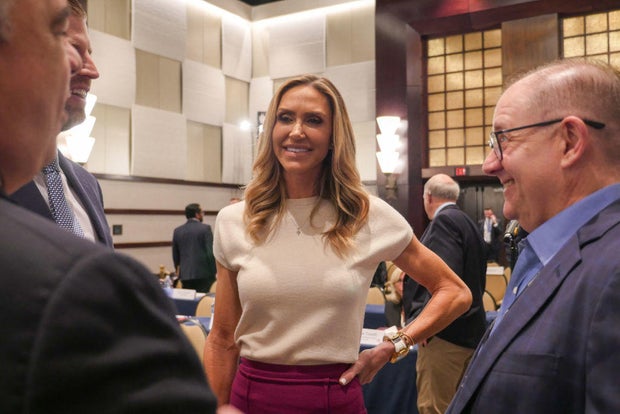The Republican National Committee voted Friday to install Donald Trump’s handpicked leadership team, completing his takeover of the national party as the former president closes in on a third straight presidential nomination.
Michael Whatley, a North Carolina Republican who has echoed Trump’s false theories of voter fraud, was elected the party’s new national chairman in a vote Friday morning in Houston. Lara Trump, the former president’s daughter-in-law, was voted in as co-chair.
Trump’s team is promising not to use the RNC to pay his mounting personal legal bills. But Trump and his lieutenants will have firm control of the party’s political and fundraising machinery with limited, if any, internal pushback.
“The RNC is going to be the vanguard of a movement that will work tirelessly every single day to elect our nominee, Donald J. Trump, as the 47th president of the United States,” Whatley told RNC members in a speech after being elected.
Whatley will carry the top title, replacing longtime chair Ronna McDaniel after she fell out of favor with key figures in the former president’s “Make America Great Again” movement. But he will be surrounded by people closer to Trump.
Lara Trump is expected to focus largely on fundraising and media appearances.
She emphasized that shortly after she was voted in, taking time in her inaugural speech as co-chair to hold up a check for a $100,000 that she said had been contributed that day to the party. When asked by a reporter later, she declined to say who wrote the check.
The functional head of the RNC will be Chris LaCivita, who will assume the committee’s chief of staff role while maintaining his job as one of the Trump campaign’s top two advisers.
McDaniel was handpicked by Trump to lead the committee seven years ago but was forced out after Trump’s MAGA movement increasingly blamed her for losses over the last few years. She alluded to that in her goodbye speech Friday, telling the members that she worries most about “internal cohesion” heading into the election.
“We have to stop the attacking other Republicans,” she said. “If we spend our time attacking each other, we guarantee the Democrats are going to win.”
She also told the party that it needs to engage independent and swing voters, warning: “We don’t win if we only talk to each other.”
While McDaniel got a standing ovation after her goodbye, the new leadership eagerly embraced the change, and Lara Trump, accompanied by her husband, Eric Trump, was greeted like a celebrity, with members lining up to take photos with her.
With Trump’s blessing, LaCivita is promising to enact sweeping changes and staffing moves at every level of the RNC to ensure it runs seamlessly as an extension of the Trump campaign.
In an interview Thursday, LaCivita sought to tamp down concerns from some RNC members that the already cash-strapped committee would help pay Trump’s legal bills. Trump faces four criminal indictments and a total of 91 counts as well as a $454 million civil fraud judgment, which he is appealing. His affiliated Save America political action committee has spent $76 million over the last two years on lawyers.
People speculating about the RNC paying for legal bills, LaCivita said, do so “purely on the basis of trying to hurt donors.” Trump’s legal bills are instead being covered largely by Save America, a separate political entity.
“The fact of the matter is not a penny of the RNC’s money or, for that matter, the campaign’s money has gone or will go to pay legal fees,” he said.
The RNC was paying some of Trump’s legal bills for New York cases that started while he was president, The Washington Post reported, but McDaniel said in November 2022 that the RNC would stop paying once Trump became a candidate again and joined the 2024 presidential race.
When Trump announced his plans to replace the party’s leadership, it raised fresh questions about whether the committee would pay his bills. Those questions intensified after Lara Trump said last month that she wasn’t familiar with the party’s rules about paying her father-in-law’s legal fees, but she thought the idea would get broad support among Republican voters.
Facing such mixed messages, some RNC members remain skeptical.
Republican committeeman Henry Barbour, of Mississippi, proposed a non-binding resolution explicitly stating that RNC funds could not be used for Trump’s legal bills. Yet the resolution died when Barbour failed to earn the support of RNC members from at least 10 states.
“People I’ve talked to on the committee privately all agree that donor money needs to be devoted to winning elections, not legal fees,” said Republican committeeman John Hammond of Indiana. “I’m sure the committee would be glad to have some more assurance about that and clarification.”
The new leadership team is also expectedly to more fully embrace Trump’s focus on voter fraud and his debunked claims about the election he lost to President Biden. Multiple court cases and Trump’s own Justice Department failed to reveal any evidence of significant voting irregularities.
Whatley, an attorney, has largely avoided using Trump’s characterization of Mr. Biden’s victory and said in one 2021 interview that Mr. Biden “absolutely” was legitimately elected and won the majority of the Electoral College votes. But he said in another interview in the weeks after the 2020 election that there was “massive fraud.” He has also made focusing on “election integrity” a top priority for his state party in the years since.
In a letter announcing her candidacy for co-chair, Lara Trump wrote to members of the committee telling them she intends to focus on battleground states, getting out the vote in close races, combing through the RNC’s finances and cutting spending “that doesn’t directly go to winning elections.”
A key priority, she wrote, is working to ensure that the election is secure, something her father-in-law has made a chief focus.
In her speech Friday, Lara Trump declared: “I’m ready to get to work.”
“The goal on Nov. 5 is to win, as my father-in-law says, ‘bigly,'” she said.
In some ways, Trump’s GOP takeover represents a typical transition for major political parties when they shift from the primary to the general election phase of presidential elections. Candidates are typically given the keys to their national parties once they secure the presidential nomination. Mr. Biden, for example, effectively controls the Democratic National Committee.
Yet some privately worry that Trump is creating unnecessary drama and distraction for the party.



